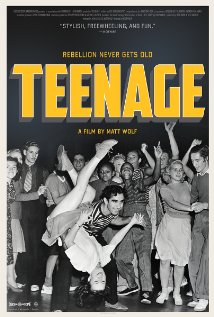Teenage (Matt Wolf, 2013)
Since the last decade, a growing trend in documentary films has been observed. They are made to be educational, documenting on a significant event or tendency in 20th-century history. Using archive footage (often digitally restored and colored) from the time period, an ultra-dramatic voice-over narration that emphasizes even more the seriousness of the topic, these documentaries draw on impressive media coverage, and aim at giving a fresh and modern look to decisive periods from the past. Like the Apocalypse documentaries, which have focused so far on Hitler and World War I, gaining phenomenal television ratings on French and Belgian ratings.
Teenage belongs to that category of ambitious documentaries. The film seeks to explain a half-century of teenagehood, from repressed teenagers, who had to go straight from conforming to the social norms, to individuals manifesting their power and desire to express themselves on major issues encountered throughout the century, such as sexuality, racial and gender equality, cultural identity.
Drawing from an impressive collection of archive footage, film clips, commercials and other forms of visual media, the film exposes the teenagers’ dreams, frustrations and desires from the early 20th century to the 50s, thanks to many testimonials delivered in voice-over narrations. While Teenage is the result of extensive research in portraying youth culture in the eve of what is considered now a major age group, the execution rather gave me a déjà-vu effect.
This new form of documentary that promises an immersive approach misses its target, as its tend to over-dramatize the topic, using archive footage as fillers, and even worse so, as arbitrary images that hardly compliment the narration. While the collage is ingenious and can be admired for its variety and its utility as historical documents, it is more a tool of manipulation to tell a different message intended from its original use in order to suit a current pattern or contemporary paradigm. All these footage are also the result of censorship and manipulation based upon the time’s social, political and cultural mores and taboos, so using them now as essential tool of analysis gives a limited and misleading outlook to the complexities of the subject.
I always expect to approach a documentary expecting to learn something incredibly new and mind-blowing about a topic, character or time period. Which isn’t what I totally got from Teenage, except for the brief clips that analyzed youth indoctrination during Nazi Germany. What seems to be missing is personal testimonial from a witness who addresses the camera and recounts a first-hand experience,a technique that would have allowed a tangible aspect to the project, as well as a personal tone.
In conclusion, such an ambitious project would have benefited from more appropriate running time given to each period. Perhaps a mini-series format à la Ken Burns (director of brilliant documentary series The Civil War, The War) would have been a far more suitable choice, to allow the viewer to understand the many complexities and significance of the subject.
